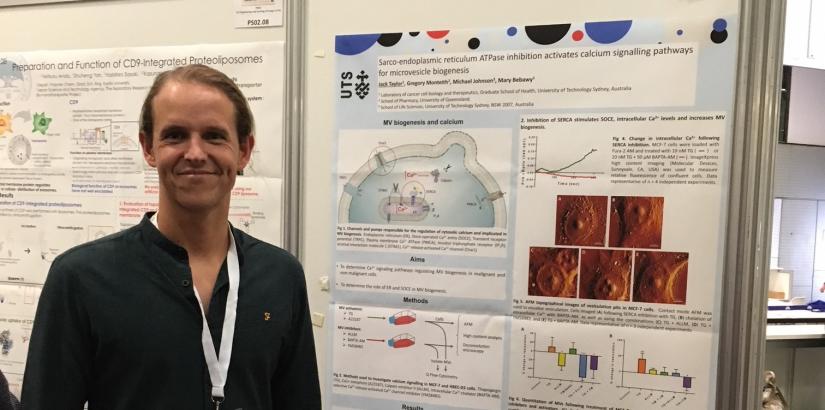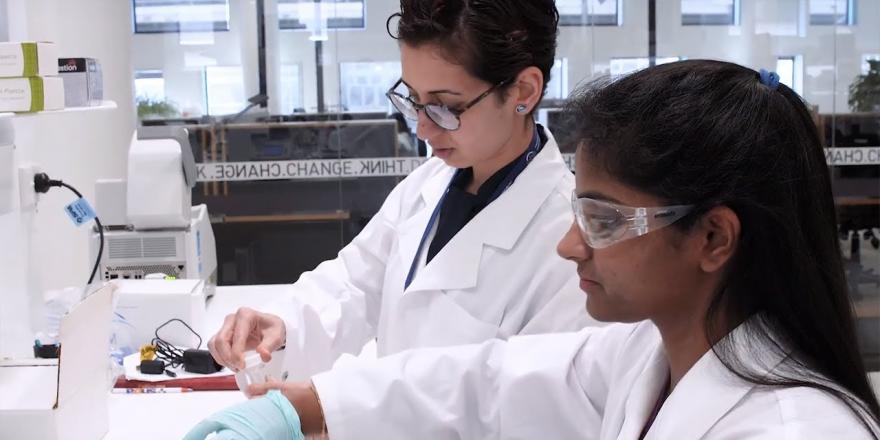Jack Taylor explains the widespread problem of multidrug resistance in cancer treatment and how his PhD is contributing to the solution.

Jack Taylor says his UTS Master of Pharmacy really opened his eyes to the possibilities of a career in the pharmaceutical industry. “I got the opportunity to do some industry placements and saw a much wider variety of career paths than I imagined previously,” he says.
“I really enjoyed the research component of my masters, so starting my PhD was an easy decision. I had also already worked with Mary Bebawy, my PhD supervisor, on a piece of research during my masters and knew we’d work well together.”
Jack’s PhD is focused on the issue of multidrug resistance, a widespread problem in not just cancer therapy but treatments for other diseases and conditions too.
“Cancer multidrug resistance is a phenomenon where you treat patients with a certain chemotherapeutic drug, and then, after a time of remission, they come back for another round of treatment and suddenly the cancer is resistant to not only the drug you treated them with, but other drugs that are completely different,” explains Jack. “This can obviously have dire repercussions for patients.”
Professor Mary Bebawy runs the Cancer Cell Biology and Therapeutics Laboratory in the Graduate School of Health and says Jack’s research is important to the lab’s overall objectives.
“Our primary aims are to understand the role of extracellular vesicles (specifically microvesicles or large extracellular vesicles) in driving cancer biology; and to translate that knowledge into novel anticancer therapies and diagnostics,” she says.
Microvesicles are shed from the surface of cancer cells and researchers know they play an important role in driving cancer multidrug resistance, metastasis and evasion of the immune response but don’t know exactly how they are formed by cancer cells.
I’m trying to figure out how these microvesicles are formed and how they transmit chemotherapeutic multidrug resistance to other cancer cells.
“The research Jack is doing is helping us understand the cellular mechanisms driving the production of these vesicles in cancer cells. As a result, we can identify cancer selective proteins and pathways involved in the process which can lead to the identification of new druggable targets to treat cancer cells specifically, without impacting on normal healthy cells,” continues Mary.
According to Jack, the potential benefits of this research are twofold. Firstly, it will benefit the scientific community. “This is a relatively new field and there is lots to learn because microvesicles have functions in normal cells too. Understanding how they work is of great importance to other researchers,” he explains.
“The second potential benefit is that it will go some way towards improving cancer patient outcomes in the long term.”
Three years into his project and Jack is very pleased with his progress. “We’ve discovered discrete pathways exist in cancer cells compared to non-cancerous cells, and we’ve discovered that normal cells secrete microvesicles through alternate pathways which differ from those in cancer cells,” he explains.
“This is very encouraging for future drugs that will need to target cancer cell vesicle production but leave the non-cancerous cells unencumbered.”
With his PhD finishing up in the middle of the year, Jack is starting to scope out job opportunities. “I want to continue doing research, but I’m not sure in what capacity yet. I’ve got a couple of industry mentors who are helping me explore the possibility of going into an industry setting, but staying in academia is a good option too,” he says.
“My main problem is that I have too many interests and directions I could go in, but that’s certainly not a bad problem to have.”

Cherie Lucas:
Broadly speaking, my research is about pharmacy education and interprofessional collaboration. I test strategies that enable students to derive to better clinical decisions through reflective practices. I certainly hope that this type of research enables students to be better practitioners, making better decisions for better clinical outcomes for the patients.
I use a number of different strategies, so the RACA, the Reflective Ability Clinical Assessment, but I also use the RIPE Model, which is the Reflective Interprofessional Education Model, and we use the medium and high fidelity mannequins and simulation in standardized patients. We've been putting this research into practice, we've published around this model of learning, and recently we actually received a university award for this model of learning, too.
Helen Benson:
My research is focused on the integration of pharmacists in general practice, which means when you go in to see your doctor, there's not only a nurse or a physio that you can see within the practice, but also a pharmacist. Pharmacists are really enjoying working within the general practice. It gives them a chance to use their skills and really show other healthcare professionals what they can do. The GPs have also loved having someone there to support them in helping patients understand their medications. I really hope that our research shows that having a pharmacist involved in a general practice team stops patients going to hospital because of drug related problems, helps them get the most out of their medicines, and really helps them control their disease states.
Mehra Haghi:
My research is on chronic airway inflammations as presented in asthma, chronic obstructive pulmonary disease and cystic fibrosis. There is currently no cure for these diseases and current anti-inflammatory formulations are insufficient.
We are currently working on a pre-clinical validation of a novel anti-inflammatory platform that we've developed. We can load it with different therapeutics, and these therapeutics are going to induce cells' own recycling mechanism to target inflammation. This is a paradigm shift. No other therapeutic on the market has taken this approach to resolve inflammation.
In patients with lung diseases like asthma and cystic fibrosis, when the patients gets to a stage that they become refractive and they do not respond to current corticosteroid therapies, then this new treatment would be another option that helps their body's own mechanism, recycling mechanism, to fight the inflammation and clear the inflammation.
Lisa Pont:
My research is looking at the safety and the quality of the way medicines are used in hospitals and nursing homes. I get medicine supply data from a pharmacy or an industry partner that has worked with nursing homes, and by looking at what's happening in the real world, we're able to identify problems, start to think about solutions, and change the way that medicines are used in facilities and in hospitals.
I'm passionate about my research because I'm a pharmacist, and I started my life in the hospital setting where my specialty area was medicines used in older people. So it made sense for me, when I moved across to research, to bring that clinical knowledge and that background with me, that I'd been working one-on-one with older people and their medicines, and so it was just a natural progression to look at how we could improve things at that population level.
Jack Taylor:
My research is interested in microvesicles. Microvesicles are small bubbles that are released from the surface of all cell types. In cancer, these microvesicles or bubbles pass messages that increase drug resistance, increase metastatic capacity. So basically, these microvesicles are causing the progression of cancer.
Multidrug resistance is a huge problem in cancer. We get clinical relapse of patients when they're treated with a chemotherapeutic agent, and we believe this is because of microvesicle signals, so in the end, we hope to come up with novel therapeutics that target these vesicles to stop the progression, stop multidrug resistance, and improve patient outcomes.

